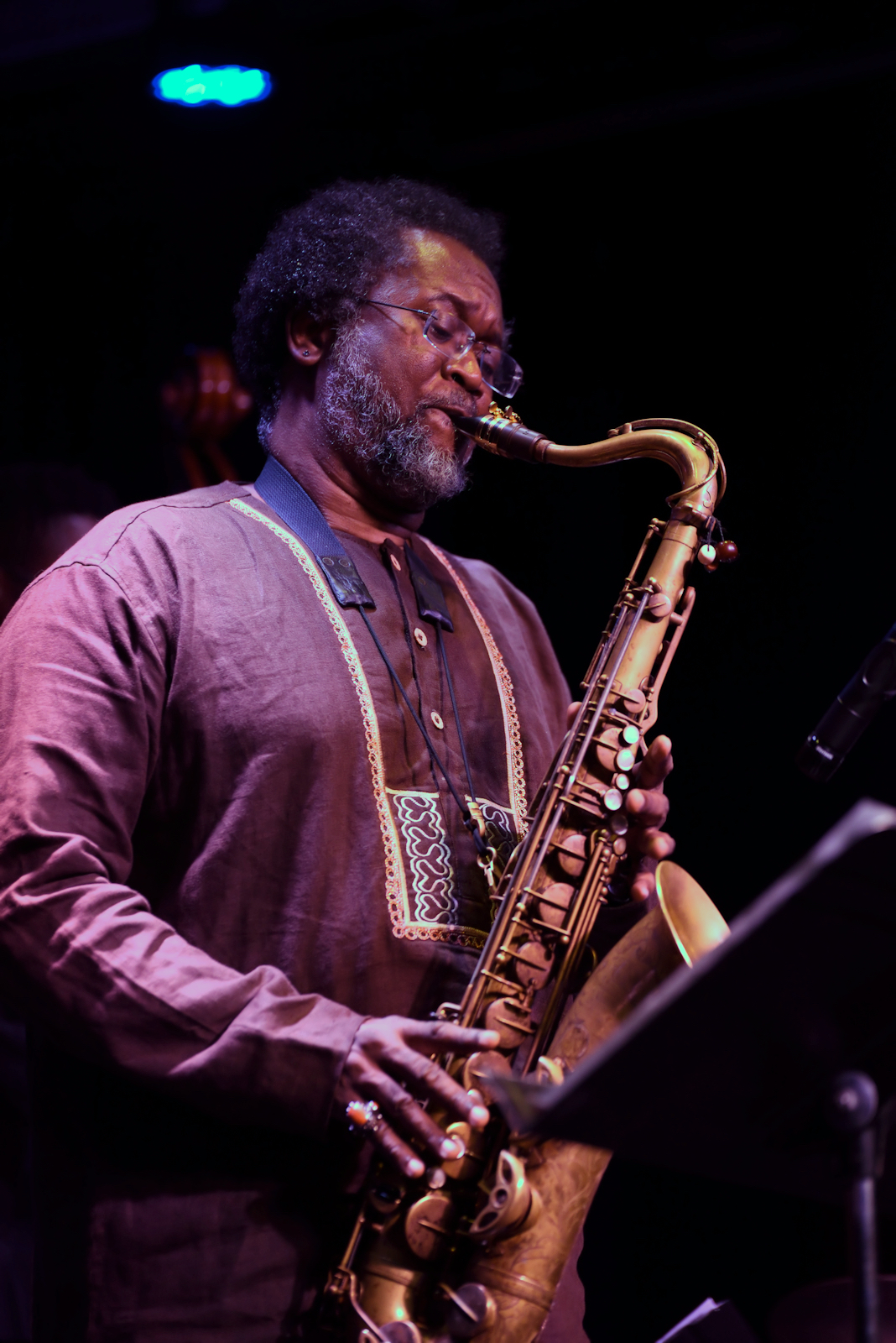

A master tenor saxophonist, multi-reedsman, composer, and jazz educator, Salim Washington is one of the fastest rising stars on the New York jazz scene today. The leader of the Harlem Jazz Ensemble, he’s also a historian who studied under Henry Louis Gates at Harvard and wrote a doctoral dissertation on John Coltrane.
A master tenor saxophonist, multi-reedsman, composer, and jazz educator, Salim Washington is one of the fastest rising stars on the New York jazz scene today. Born in Memphis, Tennessee, the eldest of five children born to Tony Washington and Stella Jean Key, he moved to Detroit, Michigan with his family at the age of eight.
As was the custom in Black Bottom Detroit, he was drafted into the neighborhood gang (in those days, youth gangs were more involved in petty mischief than in homicide and the drug trade). The gang leader happened to play trumpet, and was the vessel that led Salim to music. Having more talent for music than for gangs, he pursued music first as a trumpet player, and later as a student of classical piano. By middle school, Salim was playing in school ensembles and student funk bands. He also was deeply influenced by the musical culture of the Church of God in Christ (COGIC), a Pentecostal sect in which his father was a minister.
After hearing a jazz ensemble of professional musicians for the first time, he began a search for recordings: a friend of his passed on influential recordings by Sonny Rollins, John Coltrane, the Miles Davis Sextet at Newport, and Thelonious Monk. These sounds changed him forever, so much so that he was driven to give away a sizeable soul and R&B collection (a move he later admits to regretting). This was the time in which he became a true believer, especially in the sound of Trane.
His college years brought him to the Boston area and Harvard. During his first year as an undergrad, he discovered Charles Mingus, and listened very closely to his music daily. Mingus had a profound effect on his composing, in much the same way as Rahsaan, Trane, Pharaoh, and Dolphy had on his playing. He began to hang out with friends from the Berklee College of Music, and had every intention to quit Harvard and transfer. He was talked out of it by Eileen Southern, the dean of black musicology, then the head of Afro-American Studies. However, the life of the gigging jazz musician proved irresistible – he spent more time practicing, playing, and composing, and quit school after two years. Out of school he joined the Worlds Experience Orchestra under the leadership of Jamyl Jones, which played “free” but was very disciplined at the same time. Their specialty was collective improvisation.
He then joined the Source of Life Arkestral Revelation (SOLAR) in Boston, touring with them extensively throughout the south. Their brand of music was conscious music with a spiritual message. They played an underground “chitlin circuit” from Georgia to Louisiana.
Returning back home to Detroit, he became much more involved with his church. In COGIC, he led the gospel band and choir. He also joined the Sun Messengers, a band which was inspired by Sun Ra’s Arkestra. He played with other Detroiters and began teaching music in prisons through the Prisoners’ Access to Creative Experiences (PACE). He also taught music in Detroit’s public schools.
He eventually returned to Boston to finish his degree, and gradually became part of the Roxbury music scene. After apprenticing in clubs such as Wally’s, M&M’s, Slades, Taurus, and Connolly’s he joined the Billy Skinner Double Jazz Quartet (DJQ), with whom he made his first recording and overseas tour. After the dissolution of the DJQ, he began to lead his own band.
His first major gig as a leader was with an ensemble he put together for the Dark Room, a reading series featuring established and emerging literary talents from the African-American tradition. From this gig was born the Roxbury Blues Aesthetic (RBA), which provided him with sympathetic musicians who would concentrate on a repertoire of his original compositions as well as the music of Mingus, Monk, Stevie Wonder, and others. He began to earn commissions as a composer and arranger, and also recorded his debut CD “Love In Exile” with RBA, featuring pianist and composer, Joe Bonner. While doing this, he was midway through graduate school at Harvard, where he wrote a dissertation entitled “Beautiful Nightmare: Coltrane, Jazz, and American Culture,” under the supervision of Henry Louis Gates. It is now being prepared for publication as a major historical work.
With doctorate in hand, he headed to New York to play in the city, as well as begin a professorship at the Brooklyn College Conservatory of Music. While on a commission for works celebrating the life and music Dexter Gordon he established a new group, the Harlem Arts Ensemble, which continues the legacy of the Roxbury Blues Aesthetic.
In addition to his own group, Salim plays regularly with a number of ensembles including the Donald Smith Quintet, Antonio Dangerfield’s Ensemble Uniqua, Frank Lacy’s Vibe Tribe, and the Frank Lacy Octet, James Jabbo Ware’s Me, We, and Them Orchestra, the Brooklyn Repertory Ensemble, Ahmed Abdullah’s Diaspora, and the Carl Grubbs group. He has travelled extensively, playing music festivals throughout the US and Canada, Latin America, and Europe. He has also led music workshops for the Northern Ireland Arts Council in Belfast, the Bill Evans conservatory in Paris, Harvard University, the Vermont Jazz Center, Plymouth State College, and others. He is a member of the Jazz Study Group at Columbia University and has participated on various committees and panels in service of jazz, including those convened by the Ford Foundation, the Boston Pheonix, the New England Foundation for the Arts. Today he lives in South Africa where is currently a professor of jazz studies.